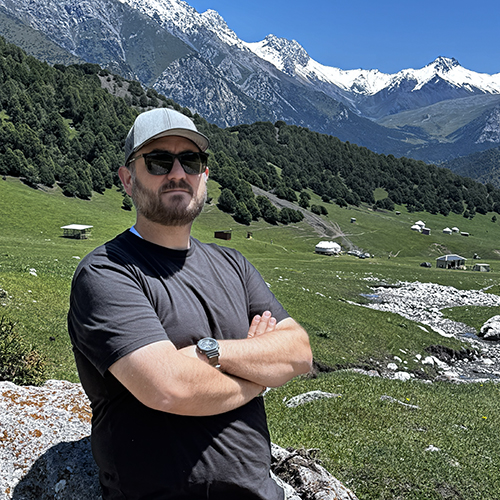When a temporary clinic opened in a rural Guatemalan village, a worried man came in with his nephew. The child’s speech was unintelligible, and the family suspected serious delays in brain development. At the clinic, speech-language pathology graduate student Stephanie Balunda offered good news, diagnosing a treatable speech delay and giving the uncle ways to help his nephew.
The man’s relief at the diagnosis was one of many memorable moments for Balunda during a ten-day service trip to Guatemala. The trip was organized by Julie Dunlap, senior lecturer in the UW Department of Speech & Hearing Sciences (SPHSC), where Balunda is a second-year graduate student.

A Speech & Hearing Sciences team has volunteered in Guatemala each spring since 2013, inspired by a guest speaker from another university who led a similar program. SPHSC graduate students planned the first trip and asked Dunlap to serve as their adviser. Dunlap and second-year graduate students have returned every year since. (Thanks to a Guatemalan translator, Spanish fluency is not required.)
“I really like to take second years because of how far along they are in the program,” says Dunlap. “I love that the students I take down are well trained and critical thinkers. I see my role as providing input but letting them make decisions as clinicians. And that’s the point — in Guatemala they get more clinical experience, in a non-traditional setting.”
The SPHSC team works with the Guatemala-based nonprofit Hearts in Motion, which handles many of the logistics for the visits, including scheduling one-day pop-up clinics in rural villages. “Hearts in Motion will contact the mayor of a small town two or three hours from its base in Zacapa, and the mayor then spreads the word,” says Dunlap. “When we show up, patients are waiting.”

For the past three years, SPHSC has partnered with UW Rehabilitation Medicine for the visits, with physical therapy and prosthetics & orthotics students working side-by-side with the speech-language pathology students. The two groups overlapped by coincidence in 2015 and found the shared experience so beneficial that they now coordinate their efforts.
The Guatemalan clinics attract a wide range of patients, from children with cerebral palsy or other speech challenges to adults recovering from a stroke or traumatic brain injury. For the UW students, the diversity is exciting. “It felt like a whole quarter-worth of clinical experience in ten days,” says Balunda. “That was just amazing for us.”
The challenge is to identify how we can most effectively help [patients] in the limited time we can see them.
There are challenges, of course. There’s only so much a speech-language pathologist can accomplish in a single visit with a patient who would normally require months of treatment. “It’s super frustrating because you see these clients and you’re thinking, ‘Oh, if they were in my private practice in the States, I could work on all of these things and it would be fantastic,’” says SPHSC graduate student Michelle Steele, also on this year’s trip. “On the flip side, it’s really nice to be able to train families in some things they can do to make a difference—things they wouldn’t have known about otherwise.”
To that end, Dunlap asks her students to provide every patient with three things they or their family can implement to continue to make progress after the visit. “We don’t just swoop in and provide speech therapy,” Dunlap says. “It’s unrealistic to think we can ‘fix’ patients while we’re there. The challenge is to identify how we can most effectively help them in the limited time we can see them.”

Sometimes those suggestions make all the difference. One Guatemalan parent was overheard telling a friend that she’d never realized she could impact her child’s language. Now that she had things to work on, she felt she had some control over what was going on with her child. “Knowing that she walked away feeling that way definitely made me feel we’d made a difference,” says Steele.
The UW group also participates in a one-day professional development seminar for Guatemalan physical therapists and physical therapy students. This year, the SPHSC team spent two hours sharing speech-language pathology information with the 40 attendees. “We gave some snapshot advice on things they could be doing with their clients and their families,” says Steele. “Some of them were so into hearing what we had to say. Educating those 40 physical therapists just really exploded our outreach. I thought it made a huge impact.”
The SPHSC students are now back on campus, in their final quarter before beginning their careers as speech-language pathologists. Balunda, who is fluent in Spanish and hopes to work in a bilingual setting, says the trip helped prepare her for what comes next.

“We talk a lot about how an articulation disorder may manifest differently in another language, but in Guatemala I could really see how these disorders manifest similarly no matter what culture you’re from,” she says. “It’s given me that confidence to work with people from other cultures.”
Something else Balunda learned from Guatemala: she’d like to make the trip again.
“There’s a lot more to be done,” she says. “People need to keep going down there. I can’t wait to go back.”
More Stories

AI in the Classroom? For Faculty, It's Complicated
Three College of Arts & Sciences professors discuss the impact of AI on their teaching and on student learning. The consensus? It’s complicated.

Through Soil Science, an Adventure in Kyrgyzstan
Chemistry PhD alum Jonathan Cox spent most of 2025 in Kyrgyzstan, helping farmers improve their soil—and their crops—through soil testing.

A Sports Obsession Inspires a Career
Thuc Nhi Nguyen got her start the UW Daily. Now she's a sports reporter for Los Angeles Times, writing about the Lakers and the Olympics.